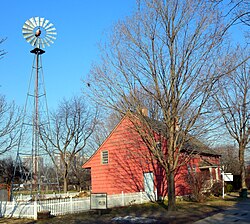The Queens County Farm Museum, also known as Queens Farm, is a 47-acre (190,000 m2) farm in the Floral Park and Glen Oaks neighborhoods of Queens in New York City. The farm occupies the city's largest remaining tract of undisturbed farmland (in operation since 1697), and is still a working farm today. Queens Farm practices sustainable agriculture and has a four-season growing program. The museum includes the Adriance Farmhouse (also known as the Cornell Farmhouse), a New York City Landmark on the National Register of Historic Places.
Cornell Farmhouse | |
New York City Landmark No. 0941
| |
 The Jacob and Catherine Adriance Farmhouse | |
 | |
| Location | 73-50 Little Neck Parkway Queens, New York 11004 |
|---|---|
| Coordinates | 40°44′54″N 73°43′13″W / 40.74833°N 73.72028°W |
| Built | 1750 |
| Architectural style | Greek Revival, Colonial, Dutch Colonial |
| NRHP reference No. | 79001620[1] |
| NYCL No. | 0941 |
| Significant dates | |
| Added to NRHP | July 24, 1979 |
| Designated NYCL | November 9, 1976[2] |
The site features restored farm buildings, planting fields with 200 types of crops, livestock, and various examples of vintage farm equipment.[3] The museum has free admission on most days, though tickets are sold for special event days throughout the year.[4] The museum hosts guided tours of the farmhouse,[5] weekend hayrides,[6] and an on-site seasonal farmstand.[7]
Cornell Farmhouse
editThe Cornell Farmhouse was built in 1750 with Dutch and English architectural features. The Farmhouse is also known as the Creedmoor Farmhouse Complex or the Adriance Farmhouse. It is part of the museum and is owned and operated by the New York City Department of Parks and Recreation (NYC Parks).[8]
It was listed as a New York City Landmark in 1976,[2] and on the National Register of Historic Places in 1979.[1]
History
editThe farm was privately owned by a Dutch family, the Adriances, from 1697 to 1808. Their three-room farmhouse, built in 1772, has been restored and still stands. After 1808, a series of families owned the farm as it continued to evolve from a colonial homestead to a modern "truck farming" or market gardening business. Under its last private farmer, Daniel Stattel, it became, by 1900, "the second largest [farm] in size in Queens County and the highest in dollar value...assessed at 32,000 dollars."[9] In 1926, the Stattels sold the farm to real estate investor Pauline Reisman, who, in turn, later that year sold it to Creedmoor State Hospital, which used it for occupational therapy, to stock its kitchen, and to grow ornamental plants for the rest of the hospital campus. In 1975, state legislation authored by Frank Padavan transferred ownership of the farm from the hospital to NYC Parks for the purpose of starting a museum.[9]
See also
editReferences
edit- ^ a b "National Register Information System". National Register of Historic Places. National Park Service. March 13, 2009.
- ^ a b "Creedmoor (Cornell) Farmhouse" aka the "Creedmoor Farmhouse Complex" aka the "Adriance Farmhouse" (PDF) (Designated November 9, 1976; No. 3; Designation List 102; LP–0941). New York City Landmarks Preservation Commission. Retrieved October 27, 2021. OCLC 1226745801, 82959432.
- ^ Ellman, Lauren Dana (October 27, 2023). "20 Best Museums in New York City for Art, History, Music, and More". Travel + Leisure. Retrieved December 19, 2023.
- ^ Culgan, Rossilynne Skena (December 13, 2023). "Best Free Things to Do In NYC From Museums to Attractions". Time Out New York. Retrieved December 19, 2023.
- ^ "Adriance Farmhouse Tours". Queens County Farm Museum. August 8, 2023. Retrieved December 20, 2023.
- ^ "Hayrides". Queens County Farm Museum. October 29, 2022. Retrieved December 20, 2023.
- ^ "Farmstand". Queens County Farm Museum. November 6, 2023. Retrieved December 20, 2023.
- ^ James A. Trent (June 1976). "National Register of Historic Places Registration: Cornell Farmhouse". New York State Office of Parks, Recreation and Historic Preservation. Retrieved July 18, 2009.[dead link]
See also: "Accompanying six photos".[dead link]
Note: Trent (born 1946), the author, was, among other things, founding President of the Queens County Farm Museum.
- ^ a b About the Farm: Series of Owners since 1697 (Queens County Farm Museum)